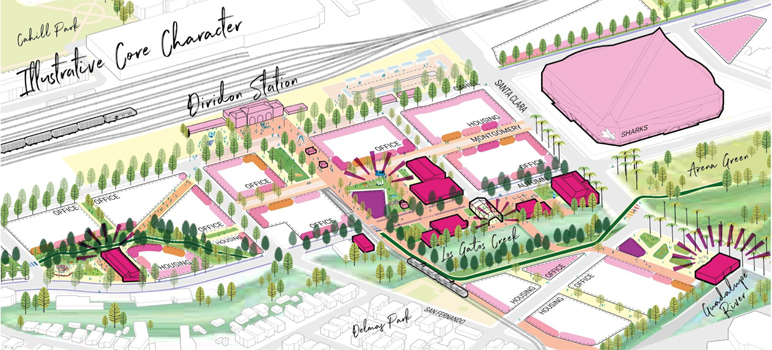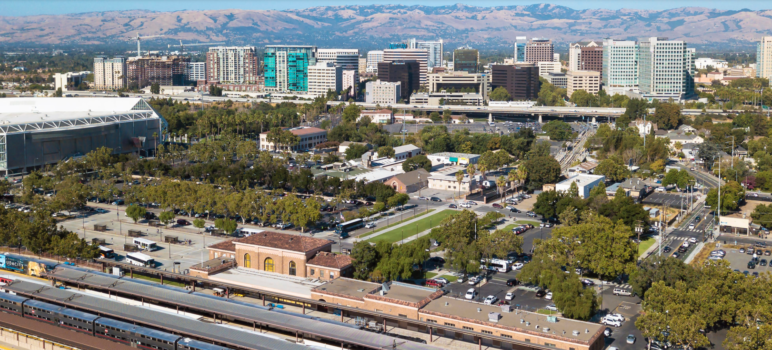Californians had a lot to keep track of this legislative season, as lawmakers worked to the buzzer debating bills to ease the crushing housing shortage, reform policing and loosen a year-old state law that limits use of independent contractors in the gig economy.
Back in San Jose, city officials and Google’s real estate team were crossing their fingers over the lower-profile Senate Bill 995, which failed in the 11th hour of an especially chaotic lawmaking session. The bill would have given Google—along with other major projects across California—a badly needed four-year extension to qualify for a state program designed to fast-track development.
The multinational tech giant aims to build a massive corporate campus—with 6.5 million square feet of offices, up to 5,000 homes, hotel rooms and 500,000 square feet of retail—near San Jose’s Diridon Station. When complete, the mega-campus could employ around 25,000 people. Though Google has long planned to use the streamlining certification, the company has fallen behind to meet the Dec. 30 deadline to qualify.
Now, San Jose and Google officials are “exploring options about how to respond,” to the bill’s last-minute failure, Kim Walesh, the city’s economic development director, told San Jose Inside. “The failure of SB 995 was a surprising and disappointing setback.”
“Surprising” may be an understatement.
SB 995 received broad, bipartisan support as it made its way through the Legislature. Many lawmakers liked it for its potential to spur more development—including new housing—during the coronavirus-caused recession. The bill, approved by both legislative bodies, looked destined to pass. Then, last-minute amendments bounced from the Assembly to the state Senate and didn’t get a final approval.
“It’s truly disappointing that the Assembly took this bill up too late on Monday night, leaving us with no opportunity to concur in the amendments before the constitutional deadline,” said state Sen. Toni Atkins (D-San Diego), the bill’s author. “These days, a roof over your head and a job to pay for it are something Californians need more than ever.”
Mayor Sam Liccardo is also calling for the Legislature to convene a special session to get the bill passed, a proposal that the Diridon Area Neighborhood Group, a community led collective, said Friday they also support.
Clock’s Ticking

Google submitted its official application on Thursday for its downtown San Jose mega-campus. (Photo Courtesy of Google)
Mountain View-based Google announced last year it would use the program, called the Jobs and Economic Improvement through Environmental Leadership Act, or AB 900.
The law comes with a list of requirements, including limits on greenhouse gases, prevailing wages for construction workers and the creation of skilled, well-paying jobs.
AB 900 also promised to speed up potential litigation, sending lawsuits straight to an appeals court, ensuring a verdict within nine months—an attractive prospect for developers hoping to avoid delays that can kill a project before it begins.
“More certainty is really what they want,” said Michael Lane, San Jose director for urban planning think-thank SPUR, which backed SB 995. “Particularly for a large project where they’re trying to line up their financing and keep things on schedule, they want certainty.”
Google and San Jose officials knew from the start that the AB 900 timeline would be tight. Then Covid-19 hit Santa Clara County, halting or slowing most industries. Community meetings—mandatory for major real estate projects—were off the table.
Google’s project fell behind, city officials acknowledged.
Officials revealed last month that a key environmental report for the Google project would be delayed from its planned Aug. 25 release until mid-November, driving home the tech giant’s timing woes.
Liccardo said he's undeterred by the setbacks.
“In a moment of historic levels of joblessness and amid our chronic shortage of affordable housing, we will continue pushing forward with this transformative project to ensure that our community can benefit from thousands of affordable apartments and millions of square feet of workspace," he said in a statement Friday.
Ripple Effects

Apple alone accounted for a $1.5 billion increase in property tax value, largely because of its new spaceship-style campus in Cupertino. (Image by Norman Foster, via Flickr)
Taking AB 900 out of the equation will impact Google’s San Jose development—no doubt. But the tech titan is assessing the impact and working with San Jose officials on next steps, a company spokesperson assured Thursday.
Google isn’t alone in this predicament.
Though the creators of AB 900 originally envisioned it for things like massive stadiums, it’s increasingly used for developments such as Google’s mixed-use project in San Jose.
In the Bay Area alone, eight companies and developers have applied for the program since its 2011 passage to jumpstart the economy after the Great Recession. Combined, those projects propose about 13,000 homes, 14.3 million square feet of commercial space and a couple new stadiums for the Oakland A’s and the Golden State Warriors.
Some have already been completed, including Apple’s 2.8 million-square-foot, donut-shaped Cupertino headquarters that is thought to have cost more than $5 billion. But other developers, including Google, are losing a race against time.
Notably, SB 995 would’ve also allowed more projects with housing to qualify for fast-tracking. That would have been a boon for the region, Lane said.
“These are larger projects that can really develop a lot of the housing that we need in the right places,” he said in a call Thursday.
There may still be hope for SB 995—or something like it.
Liccardo is still hoping for resolution this year.
"We urge a special session that will enable the Senate to consider SB 995, because this project has already met state criteria — and if not for COVID related delays, the City wouldn’t need an extension," he said in a statement Friday.
Atkins said Thursday she will “continue our work on these efforts next year.”
“Housing and jobs are two of the most fundamental needs facing Californians,” she said. “SB 995 would have provided for more housing and good jobs by creating a new tool developers could use to build more affordable homes and by increasing cities’ ability to do upfront planning and streamline approvals.”
Lane plans to hold her to her word. SPUR will push lawmakers to pick the issue back up right away in the new year, he said.
“We can’t have anyone in limbo,” Lane said. “The workers who will be building these projects need to have the assurance they’ll be able to get back to work and we’ll be able to have our economy rebound quickly. This is the way to do that”


Google promises big things.
Many people put their neck out for them, do a lot of their work.
Expectations run high, its Google of course.
Then one day, Google stops answering the phone.
Your contacts have found great new challenges elsewhere in Green Tech or AI or in Progressive Capitalism.
You are left holding a bag full of many unpleasant things.
Many people are flakes, many organizations bail on deals, no one has mastered the art like Google.
The question I have is why would the Google project add anything to downtown San Jose that is sustaining and interesting to folks outside of the immediate area? Since Redevelopment and the rest have tried to commercialize the downtown core all we’ve has is boring sameness with no one traveling to the center for retail or even entertainment beyond the millennial club scene. The Sharks are obviously assumed as a draw plus the arena events. The mistake was made decades ago when residential and retail were never added to the mix until much later. Perhaps a Google project will add energy and life..to the Google site only. What is the projected overflow effect to the businesses downtown core? I hope it works but everything we do is San Jos is catching up to correct the mistakes and deficiencies created by never doing it right the first time. The beat goes on and a few get rich.
The legislature 100% need a special session, for this and SB50 and a number of other bills, otherwise they are failing in their duty to govern.
That’s funny. Needs a bill to slow down a bill to fast track projects because their project is too slow to be a fast track project but wants to be a fast track project but can’t meet a deadline because it is too slow. I really don’t understand – Mayor Liccardo is disappointed. Why? Seems like because a state law that gets around local planning rules and processes didn’t pass? Why don’t you change your local rules and processes then? You lead the locality right? Honestly makes no sense.
Given the fact that high tech companies’ work forces are 50% at home now, and will be until Sara Cody release her anti-economy death grip on SC County, what’s the rush on the Google Project?
Google is huge. They could have put all kinds of people on the project, but they didn’t, so they missed the deadline. Boo Hoo. Pick up the pace next time, Google, and quit whining.
I am glad this did not pass. This Google move will continue to create economic inequality and stratification. Systemic discrimination occurs when those in charge decide who they employ and who they don’t based on who they like and preferred not based on readiness for the job. Housing Trust Silicon Valley and other housing projects have failed too. They too choose who they answer the phone and approve application based on connections. Some people not even get a call back to their inquiries for housing. Who supervises the mismanagement of these housing projects and measure A funding? CINDY CHAVEZ?
You know what really creates economic inequality, Fexxnist? Poor choices create economic inequality; such as getting pregnant or getting a girl pregnant before you graduate from HS; not graduating from HS; not paying attention in class and not doing homework, resulting in low grades; joining a gang or hanging with a guy who is in one because you think it’s cool; not taking full advantage of the free schooling you get, which comes with the bonus of taxpayer paid breakfast and lunch; even if you do graduate HS, not furthering your employability through education, for those who have the ability.
Another bad choice that is sure to keep you back if you were not born here—failure to learn basic English. No-one expects you to speak like William F. Buckley or Barack Obama, but learn enough English to make you employable. I cringe every time I hear a sob story about some poor person who was fired from the McDonald’s she worked at for 16 years, but still tells her sad story through an interpreter. Sixteen years in the USA and you still don’t speak even a modicum of English and you expect her to have income equity? Well, actually those people are smart enough to know they won’t ever get it. It’s the privileged white liberals who keep calling for it. Higher minimum wages just increase the cost of the goods we all buy; it’s a zero sum game. And UBI is just a reward for the lazy.
Government is partly to blame because it has eliminated almost every trade HS or job training program for those who are not college material, and the trade unions have cut back severely on apprenticeships and training programs to become a journeyman.
Just as not everyone has the ability to be a player in the NFL, NBA, MLB, NHL, etc., not everyone has the ability to be a rocket scientist, a CPA, a doctor, or an entrepreneur. So, forget about that all men are created equal so all should have equal outcomes and economic equality BS that Joe DiSalvo kept preaching.
It’s ball about bad choices, Fexxnist.
This is a big huge lobbying push by stakeholders. Google should NOT be allowed to own the public’s land. It should be forced to develop under a 99-Year lease. San Jose (and its land barons) want this deal so it will drive up land values and bail the City out from its redevelopment debt. But long-term this is a BAD deal for the people of San Jose. Google, Amazon, Apple, etc. should not be allowed to own land…they should be doing 99-Year leases.